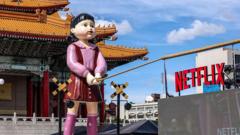Executives from notable US firms, including Intel and Skechers, are warning of the economic fallout from increasing tariffs, with many adjusting profit forecasts. The uncertainty surrounding trade policies raises concerns about potential recession, as companies navigate rising costs and seek to mitigate impacts.
Executives Express Concerns Over Tariffs' Economic Impact

Executives Express Concerns Over Tariffs' Economic Impact
Major US companies voice alarm over the effects of tariffs, adjusting profit forecasts as trade tensions continue.
Top executives from several high-profile US companies are raising alarms about the mounting impact that tariffs are exerting on their businesses and the broader economy. Industry leaders, such as Intel, Skechers, and Procter & Gamble, have either revised or completely withdrawn their profit forecasts amidst a cloud of economic uncertainty triggered by ongoing trade tensions.
President Donald Trump has been employing steep tariffs as a strategy to negotiate better trade terms with key global partners. As of now, no new agreements have been struck, although discussions with South Korea show signs of progress.
Intel's CFO, David Zinsner, emphasized the "very fluid trade policies" during an investor conference call. He warned that the situation threatens to escalate the chances of an economic slowdown and raises the risk of a recession. Following Zinsner's comments, Intel’s stock plummeted over 5% in after-hours trading due to its dismal outlook on profits and revenue.
Skechers also released disappointing news to investors, retracting its annual forecasts. The company's COO, David Weinberg, stated that the dynamic nature of the current environment leaves too much uncertainty for accurate planning. Like other competitors such as Nike and Adidas, Skechers relies heavily on Asian factories, particularly in China, for production.
Procter & Gamble (P&G) has indicated that tariffs could compel them to raise consumer prices to offset increased material costs from China and other regions. Financial Chief Andre Schulten noted efforts would be made to mitigate these tariff impacts while also acknowledging a downward revision in sales growth expectations for the year.
Seven & I, the Japanese corporation behind the 7-Eleven convenience chains, has not been immune to the ramifications of trade tensions, with North America accounting for a significant portion of its sales. Incoming CEO Stephen Dacus expressed uncertainty regarding the future tariff landscape and its effects on business operations.
These warnings reflect a growing trend among firms worldwide expressing apprehensions regarding Trump's trade policies. On Friday, Hyundai revealed it had established a task force to address the tariff fallout, projecting a tough market outlook exacerbated by escalating trade conflicts. The company is contemplating relocating some manufacturing operations outside South Korea, although it has already shifted some production from Mexico back to the US.
Meanwhile, recent meetings between US and South Korean trade officials have yielded positive dialogue regarding tariff removal. US Treasury Secretary Scott Bessent described the discussions as “very successful,” suggesting that substantial progress might be made soon. The impending expiration of a 90-day pause on heightened tariffs set for July 8th further intensifies the urgency surrounding these negotiations.






















